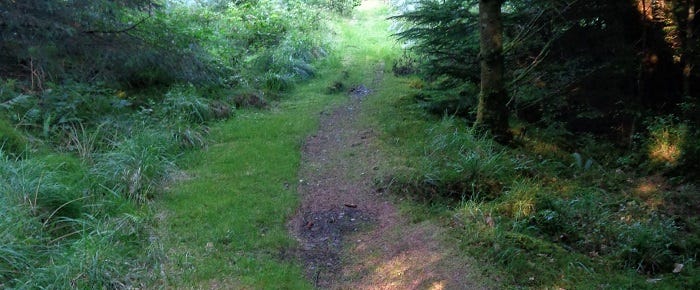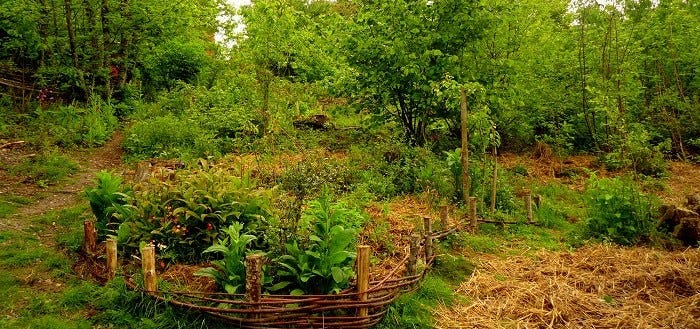Emerald City part two.
“Fungi is the ground from which forests arise and from forest all things spring.
The uplands are become a wilderness, laced with waterways, marsh and bog, home of beaver, deer, wild boar. Here the trees jostle amongst themselves. This is where the seed is collected. Lower are planted woodlands, managed for their many products, filled with people and gardens. Lower still, on bottom land, the clearings are larger, some grain, animals.
Yet forest is not closed, its grip does not strangle. Clearings open with a gale or when the gardeners select timber for different uses. Animals browse and graze and other species rise in this sudden freedom, bear their fruit and are harvested. Meanwhile the young trees stretch within them, spreading their branches. The clearings close once more, throughout the green, like breathing, the opening and closing of forest."
Konsk: 10,000 Definitions Of True Forest.
Trueman woke early and was met with more porridge and tea, both of which combined to give him a sense of quiet readiness for whatever the new day might bring.
He had spent some time the previous evening exploring the internal Heads Up Display but after the initial excitement he had soon become bored with it. He began to question what the value of always knowing the new heart's BPM and blood pressure, (both systolic and diastolic), or the body's respiration rate plus a whole range of other indicators, actually was. Yes, there were other options which he had yet to explore but did he really need a virtual compass? Surely a physical one could easily be carried in a pocket, if it was needed at all?
On the move again, they began the long descent from the pass, (Trueman's internal compass indicated their direction was to the east of south east), Rhia began pointing out various aspects of the forest below them. The fact that she offered him this information interested Trueman, for it suggested that his new body might be from a different area, where different systems were employed. This encouraged him somewhat; perhaps the new body was from a more sophisticated, technologically orientated society?
For a while Trueman half listened to her chatter about the various settlements below, all largely hidden within the forest. She was obviously happy with the whole set-up and delighted in describing it to him, like a youngster to a long lost relative. Apparently each cantref numbered a few hundred or so individuals at the most, including children, this apparently being an ideal number for an integrated community. She was also at great pains to point out that they were self-reliant rather than self-sufficient.
“Self-sufficiency leads to isolation, “she said. “You end up as a slave to the land with loads of work and no need or time to connect with anyone. Self-reliance means a cantref can get by if it really needs to but does better if it interacts and trades with others, especially its neighbours. It also means each cantref can specialise in something.”
Each of the cantrefi (which was evidently the plural of cantref) seemed to be largely self-organised and ran their own affairs through some rather simplistic sounding functional division, modelled on living organisms1. According to Rhia they formed a network of largely self-reliant communities joined together by a web of cooperative relationships.
Trueman could recognise a concept of order underlying the system but his initial interest faded as he heard how there was no single controlling or coordinating authority, that it was operated from the bottom up by whoever chose to take on the responsibility. Governance seemed to depend on an ethical basis with guiding principles rather than rules. It was all very vague and abstract, he thought, peering into the great forest. All he could really see were trees.
"Does it go on for ever?" he asked at last, exasperated.
"In some ways, yes," she said and halted Toby with a single word of command.
Trueman was baffled as to why they should stop. Rhia turned to look directly at him with a gaze that made him shiver. Anger at his lack of interest he could have understood but this was its very opposite. Her smile was so open and warm, eyes shining with care. Trueman began to tremble. She hardly knew him; surely this attention was totally inappropriate?
"Why don't you tell me what's bothering you," she asked lightly.
Almost Trueman did. It required a huge exertion of will to swallow down the uprising emotion. But he mastered it and even managed a smug smile. He was a man of science after all, he would show her who was really in control.
"I need to thpeak, speak, to someone who has authority, someone in charge. Someone at the thentre, centre of things," he stated, struggling to manage the clumsy tongue. "That is all. I don't know the way. That's all. I'm hoping that you will either take me there or at least explain to me the necessary route. Or perhaps there is some form of public transportation that I could use, if that is not too difficult to organise.”
She smiled on him throughout his short speech, never once letting the bright pierce of her gaze fall from his eyes; it was a kindly gaze and seemed filled with compassion. It took Trueman considerable effort to maintain a firm hold of the awkward voice under such an intensity of attention. When he had finished, he averted his gaze, turning instead towards the view before them, though he tried to observe her reaction from the corner of his eye.
As far as he could tell she held her gaze a moment longer then turned forwards and started Toby off with another word.
"Sure," she said without a hint of disappointment or disapproval. "I think that can be arranged.”
They had not gone much further on when a dark man in blue leggings and green smock stepped out from the shade and stuck out his thumb. He was carrying a wooden crate and was smiling, whitely. Rhia glanced askance at Trueman as Toby came to an abrupt halt. The pony snickered, though whether this indicated pleasure of nervousness, Trueman could not tell.
“Looks like I have another guest,” Rhia said flatly.
“Greetings,” the stranger called, “One who is not worthy requests a lift in order to perform a simple task.”
Rhia strove to cover a grin with her hand.
“And what name do you go by, today?” She responded, eventually.
The stranger gave Trueman a close look.
“I will be Saxon,” he said eventually.
“Oh, for goodness-.” Rhia didn't finish.
“Do you have another name?” Trueman asked impulsively, immediately regretting it as the new throat and tongue garbled the simple question.
Saxon smiled. After some thought, “Gargoyle,” he said.
They parked his crate on the front of the van and all walked together, Saxon keeping both Rhia and Toby between himself and Trueman.
“I’m presently fully occupied,“ Rhia stated after a moment, “and may be for some time, with a pressing matter. This is shared knowledge amongst the cantrefi and I’d have thought would be respected.”
Trueman was surprised at what appeared to be her formal tone, yet he could not tell whether she was also joking. About what, he wondered?
“Like trying to herd cats,” she said, turning to Trueman, as if this was an explanation. “Old country people just don't like to follow even the simplest directions coming from above.”
"Due to the rising water level," the one calling himself Saxon proffered, “I find myself forced to abandon my current dwelling and am currently engaged in visiting a vacant niche, with a view to occupying it, and my burden is rather large to carry all the way.."
Rhia seemed to accept this, if a little reluctantly.
“Oh yes?” she asked. “Any particular preferences?"
"Nothing too grand. A thirty hen niche would be fine," Saxon replied.
"You don’t think a small goat place would suit you better?"
Saxon gave a soft laugh.
“You might be right there,” he said quietly.
They walked an easy road along the valley bottom, winding with the river. Not that any road had been difficult, Trueman noted. Most of their route had followed contours and where they had come across gradients they had been gentle and long. For the first time he considered the possibility that this was not accidental but arose from conscious design.
A maze of small roads and tracks spread like an arterial web across the valley floor and horse drawn carts and other vehicles could be seen moving along them between the trees, as well as groups of people.
On closer observation, Trueman realised that almost every field or clearing also contained structures of various sorts, apparently largely of timber, some deeper browns as though of earth or mud, the turf roofs blending into their surroundings. In fact, as his eye became more accustomed to the natural curves and the sheltering trees to their northern sides, he became aware that there were dozens, even hundreds, perhaps thousands of dwellings spread throughout the valley.
They passed well-hedged, small fields of various crops. The hedges contained taller trees, mainly fruit, according to Rhia and even the fields had rows or arrays in them with complicated mixes of plants beneath. Most fields also contained small groups of people, working in them with simple hand tools.
Or rather, standing and chatting as often as working, thought Trueman, all too ready to down their tools or lean on them, wave or shout greetings, occasionally rushing over to deposit a small object and a message with Rhia, or excitedly collect an item, keeping a wary eye on Trueman.
To Trueman, many of these people appeared physically damaged, bent or twisted in some way, even lacking a limb, though apparently happy enough. They appeared to be of various races, men and women and others he couldn't easily classify, from the ancients who were helped along to babies carried in something like a papoose. At times Trueman glimpsed others apparently singing together, or wailing or shrieking, perhaps taking turns. The purpose or reason for this was not clear and left him feeling uncomfortable and even disturbed.
He turned his attention away. The more open aspect of the valley floor allowed a clearer view of the hillsides. These were more heavily wooded though still with clearings of various sizes opening like cell vacuoles in the dense cover.
Although Trueman did not know much about crops it was obvious that the cellular openings in the trees varied one from another. The bright patch of green there might be a cereal, perhaps; that darker, crinkled surface could be kale. Some clearings displayed patterns, concentric circles, thin stripes or smaller circles, rough hexagons or squares in matrices. In others he could see animals; sheep and cattle were obvious, even from this distance but some he could not make out clearly, possibly goats, lamas or even yaks? It seemed unlikely to him but then so much of it did anyway.
The surrounding woodland was also highly structured, rows visible in the canopy, running along the contours, blocks and strips of different species showing as varied hues of green or variations in topography, from gentle rounded crowns to tall spikes. Generally, even where rows of a single species were visible, others would be present, inter-planted in staggered arrays. In places he could make out more complex systems with four or five or even more species. He began to consider that these might have been specifically selected and planted for their mutual benefit. The higher he looked, the less organisation could be made out until the summits took on the appearance of rambling, natural woodland.
After an hour or so of steady though leisurely journeying they turned more towards the east and began to follow a tributary to the larger river, moving upstream and once more beginning to climb. In the distance ahead of them Trueman could see the hills rising almost to mountains, though not so craggy as previously.
They travelled onward for several more hours until the sun had just passed above and began its slow descent to the horizon behind them. When the tree cover drew back, it was hot, Trueman noted, surely unseasonably hot, harshly, baking hot. He was grateful for the shade hat and the cooler forest air carrying refreshing moisture on the gentle breeze.
Trueman felt somewhat invigorated, despite the fact that under his control the new body stumbled occasionally and the embedded thorns nagged. He found it best to let it get on with itself, turning his attention outward to the green vistas that rose up around him.
Once more his precise, concentrated mind softened and at times he fell into something of a dreamlike state, his gaze broadening such that he seemed to take in the whole panorama of earth and sky, rather than single, specific details. When he did so, the body relaxed into a fluid, easy stride, moving ahead of the others, the aches and pains receding as the tension held in the muscles dissolved into the movement. Each time he consciously attempted to slow the body’s pace, it staggered, as though resenting his interference. He caught glimpses of Rhia and Saxon exchanging glances.
Most of the time, though, the new body had felt persistently awkward and distant from the root of his being, which he of course considered to be his brain. He found that the ache in his neck had returned, even though that was an experience of his old body, his real body, he insisted. How could that be? He couldn’t work it out. The embedded thorns in his calf also still throbbed dully but he managed to largely ignore them.
He was more tired than he felt he should be, as if he had expended considerable mental energy, his mind feeling worn, as after some long and intense debate which had required protracted thought. He was at a loss to account for this; as far as he could remember he had been intellectually completely unchallenged. He put it down to the general state of confusion and disappointment in the situation.
Thus did Trueman suppress his feelings. The new body responded accordingly. Muscles in the abdomen tightened making the small of the back slightly convex, drawing the shoulders up and round, tipping the neck forwards and thus the head upward, so that he might see in front of him. Not that he could see much in the growing gloom.
If he could find some sort of centre, Trueman was thinking, where authority resided, he could be rid of this unsophisticated young woman and her primitive means of transport. If he ever found it; he was not sure how far they had travelled that day but it could not have been more than fifteen or twenty kilometres. If the centre was any great distance away it might take them weeks to arrive. Perhaps once there he might borrow an electric vehicle or perhaps a flying machine and travel on to more technologically advanced areas, even meet up with intellectual peers who could help him understand the evident disaster that had overtaken the earth.
For it seemed obvious to him now that, if he was still on his home planet and in some distant future rather than the past, then it was a post-apocalyptic one, the remnants of humanity having been forced to adopt primitive lifestyles and patterns of behaviour in order to survive.
Considering the damaged people, he thought, the invalids and cripples, the jumble of ages and races, why, it was likely that he was observing a society struggling on the brink of extinction. He sniffed and felt better, then stumbled in the darkness. No street lights, of course, he thought, as though this was further conclusive evidence.
As if in answer to his unspoken words a glow of illumination sprung up around the caravan, making even Toby raise his head. Trueman thought the light was quite impressive, presumably battery operated lanterns of some sort; they swung gently from poles slipped into sockets on the front of the cart body. It was not particularly bright but rather warm and cosy, just enough to see safely where he was placing his feet. He yawned.
“Sorry,” Rhia was apologetic. “We tend to just go on in the darkness. Not be long now. Another travel-lodge, just ahead.”
At this, the man who was calling himself Saxon, laughed.
Many thanks for reading and for the comments and likes, which are always much appreciated. Thanks also and a warm welcome to new subscribers- thankyou for signing up! All images are mine unless otherwise stated in the footnotes. Remember I am open to ideas for what should be included on the way, suitable illustrations and links to relevent sites. Till the next time, hwyl!
Stafford Beers Viable Systems Model is an early example of this insight though there are now many others.





